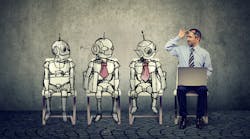The Equal Employment Opportunity Commission (EEOC) has launched an initiative to ensure that artificial intelligence (AI) and other emerging high-tech tools used in hiring and other employment decisions comply with federal civil rights laws.
“Artificial intelligence and algorithmic decision-making tools have great potential to improve our lives, including in the area of employment,” commented EEOC Chair Charlotte A. Burrows when she announced the new program. “At the same time, the EEOC is keenly aware that these tools may mask and perpetuate bias or create new discriminatory barriers to jobs. We must work to ensure that these new technologies do not become a high-tech pathway to discrimination.”
The subject matter is no joke, nor is it a novel concern. Some AI-type programs have been accused of contributing to employment bias, depending on how they have been programmed. Under the EEOC’s new initiative, a working group made up of commission staffers will be charged with organizing the agency’s response as well as gathering already existing research data to inform future enforcement efforts.
Earlier research in other areas also found that facial recognition systems failed in recognizing non-white individuals. Similar lapses also were found when it came to pedestrian detection programs for autonomous vehicles and visual recognition systems for devices like water fountains. Machine learning displayed higher error rates for certain demographic groups than others.
The EEOC said its new initiative will examine more closely how technology is fundamentally changing the way employment decisions are made. It aims to guide applicants, employees, employers and technology vendors in ensuring that these technologies are used fairly and are consistent with federal equal employment opportunity laws.
The commission said it plans to:
• Establish an internal working group to coordinate the agency’s work on the initiative.
• Launch a series of listening sessions with key stakeholders about algorithmic tools and their employment ramifications.
• Gather information about the adoption, design and impact of hiring and other employment-related technologies.
• Identify promising practices for avoiding discriminatory actions.
• Issue technical assistance to provide guidance on algorithmic fairness and the use of AI in employment decisions.
Moving Against Employers
The commission stressed the point that it has been examining the issue of AI, people analytics and Big Data in hiring and other employment decisions since at least 2016. That year, the EEOC held a public meeting on the equal employment opportunity implications of Big Data in the workplace.
In addition, the EEOC’s systemic investigators already had received extensive training in 2021 regarding the use of AI in employment practices, the agency revealed.
Some of this activity is seen as the commission’s way of responding to a November 2020 letter sent by 10 U.S. Senators asking the agency to focus on employers’ use of AI, machine learning and other hiring technologies that may result in discrimination, according to attorneys Daniel Butler and Kevin White of the law firm of Hunton Andrews Kurth.
“Many attorneys and AI commentators agree that AI—such as automated candidate sourcing, resume screening, or video interview analysis—is not a panacea for employment discrimination,” they explain. “The technology, if not carefully implemented and monitored, can introduce and even exacerbate unlawful bias.”
This can happen because algorithms generally rely on a set of human inputs, such as resumes of high-performing existing employees, to guide their analysis of candidates, Butler and White point out. “If those inputs lack diversity, the algorithm may reinforce existing institutional bias at breakneck speed. This can lead to claims of disparate impact discrimination.”
The EEOC has made it clear that it will take a heightened interest in any such claims. Last September, Commissioner Keith Sonderling said the commission recognizes the potential for AI to mitigate unlawful human bias, but said it is wary of rapid, undisciplined implementation that may perpetuate or accelerate such bias.
He also warned that in the future the EEOC may choose to resort to commissioner charges—agency-initiated investigations unconnected to an employee’s charge of discrimination—to ensure that employers are not using AI in an unlawful manner, particularly under the rubric of disparate impact claims.




